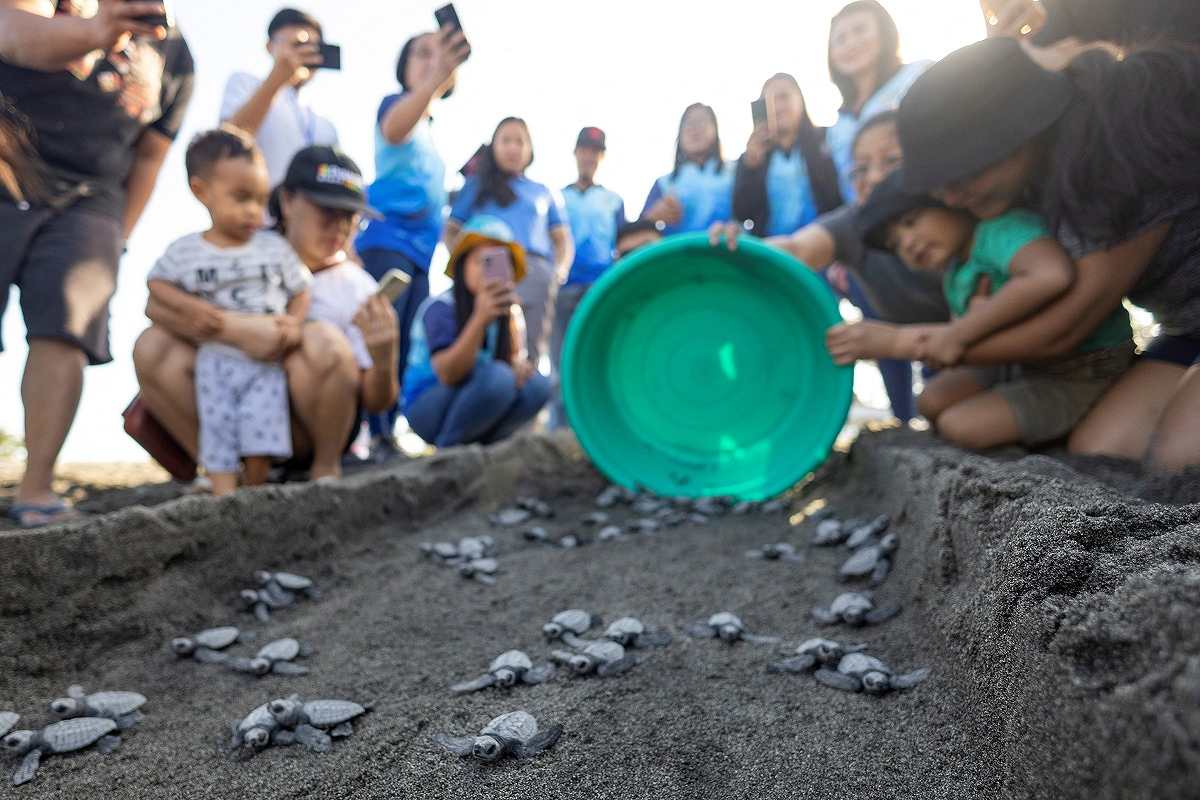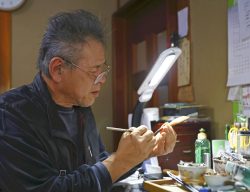
Spectators watch as olive ridley hatchlings make their way to the sea in La Union province in the Philippines on Jan. 12.
15:00 JST, February 20, 2023
LA UNION, Philippines (Reuters) — Armed with a wooden stick, a bucket and a headlamp, Philippine construction worker Johnny Manlugay hunts every night for the eggs of sea turtles on the pristine beaches of the northern province of La Union.
The 55-year-old can easily spot nesting sites, having been trained in his youth by his grandfather how to track the animals and their eggs, which his family traded at the time or ate.
But his egg-stealing days are over. Now Manlugay has turned his skills to helping protect marine turtles on the provincial beaches favored by the endangered olive ridley species to build nesting sites.
“I’ve learned to love this work,” said Manlugay, who was accompanied by his two dogs. “We didn’t know poaching was illegal and that we should not eat turtle eggs and meat.”
He carefully transferred each egg into his pail, along with some sand from the turtle nests, to be turned over to the group spearheading a conservation program on the beaches, Coastal Underwater Resource Management Actions (CURMA).
All five species of sea turtles found in the Philippine archipelago — green, hawksbill, loggerhead, leatherback, and olive ridley — are endangered.
Slaughtered for their eggs, meat and shells, the turtles, or “pawikan” as they are called, also face threats from trade, hunting, habitat loss and climate change.
But the conservation effort established in 2009 has transformed sea turtle poachers into allies, offering incentives and training to help save thousands of turtles and keep their eggs from ending up in markets and on plates.
“We talked to the poachers, and it turned out poaching was just another means for them to earn a living,” said Carlos Tamayo, the program’s director of operations. “They had no choice.”
Sea turtles lay 100 eggs to a nest on average, while the numbers of nests range between 35 and 40 each season, which runs from October to February.
Tamayo added that the figure had doubled during the first year of the coronavirus pandemic. At a time when disease curbs kept people indoors, there was a rebound in many aspects of animal activity.
“Last season alone, for example, we had 75 nests and we released close to 9,000 hatchlings,” Tamayo said.
Volunteers receive 20 pesos ($0.37) for each egg collected, or four times what they might earn from selling them. The eggs are transferred to the program’s hatchery to be reburied in protected areas.
Former poacher Jessie Cabagbag, who grew up eating turtle meat and eggs, said the extra income from egg collection went a long way for his family, which relies mainly on fishing for its livelihood.
“The incentives help us pay for our food and electricity bill. When I got lucky, I was able to save and use it to buy a tricyle which I use [to ferry passengers] when I could not go out to fish, so that’s another source of income,” he added.
Cabagbag, whose wife and 7-year-old son accompany him in patrolling the La Union beach of Bacnotan, has handed more than 1,000 eggs to CURMA since October.
“I stopped poaching when we underwent training and were taught that what we have been doing was illegal, and that these species of turtles are endangered,” said the 40-year-old.
Tourists flock to the spectacle of the blue-gray hatchlings scurrying madly down the sloping beach to reach the water after they are released.
The event inspired overwhelming joy in Cabagbag, he said.
“I am truly proud. Even our neighbors, they appreciate what I do, because it is not easy. I am happy that I get to contribute to the conservation of the ‘pawikan.’”
Top Articles in World
-

Israeli Ambassador to Japan Speaks about Japan’s Role in the Reconstruction of Gaza
-

Videos Plagiarized, Reposted with False Subtitles Claiming ‘Ryukyu Belongs to China’; Anti-China False Information Also Posted in Japan
-

Nepal Bus Crash Kills 19 People, Injures 25 Including One Japanese National
-

South Korea Tightens Rules on Foreigners Buying Homes in Seoul Metro Area
-

Ukrainian Ambassador Closely Watching Japan’s Revision of Defense Export Rules, Hopes for Future Arms Support
JN ACCESS RANKING
-

Producer Behind Pop Group XG Arrested for Cocaine Possession
-

Japan PM Takaichi’s Cabinet Resigns en Masse
-

Man Infected with Measles Reportedly Dined at Restaurant in Tokyo Station
-

Israeli Ambassador to Japan Speaks about Japan’s Role in the Reconstruction of Gaza
-

Videos Plagiarized, Reposted with False Subtitles Claiming ‘Ryukyu Belongs to China’; Anti-China False Information Also Posted in Japan

























